Internal quality assurance in the field of study and teaching takes place after successful system accreditation by Leibniz University Hannover as part of the “Leibniz Quality in Teaching” programme (LQL-Programme).
The LQL-Programme rests on a many-layered concept which develops different components of existing internal quality assurance in the field of monitoring and evaluation and, through the LQL-Review, extends them by a third level of quality assurance, which supersedes the previous programme accreditation.
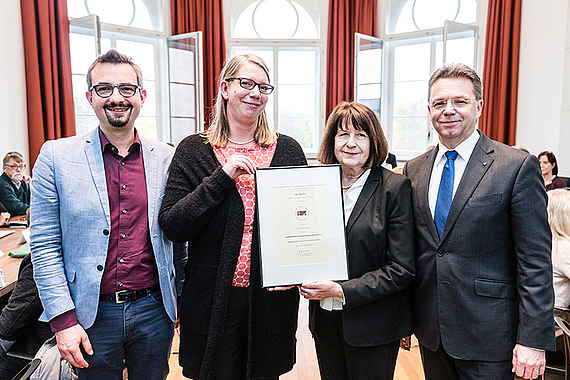
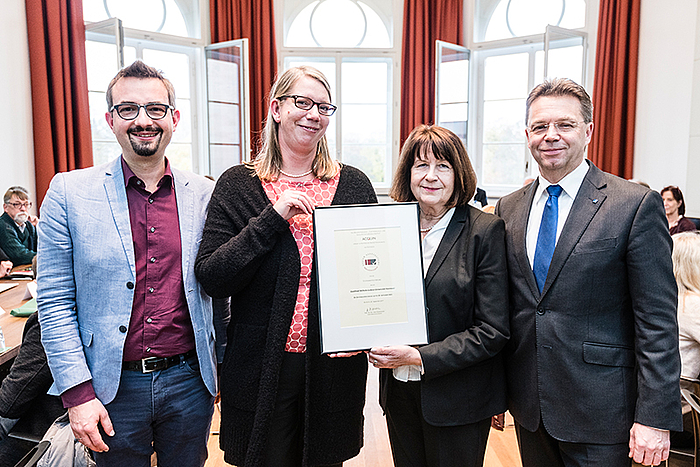
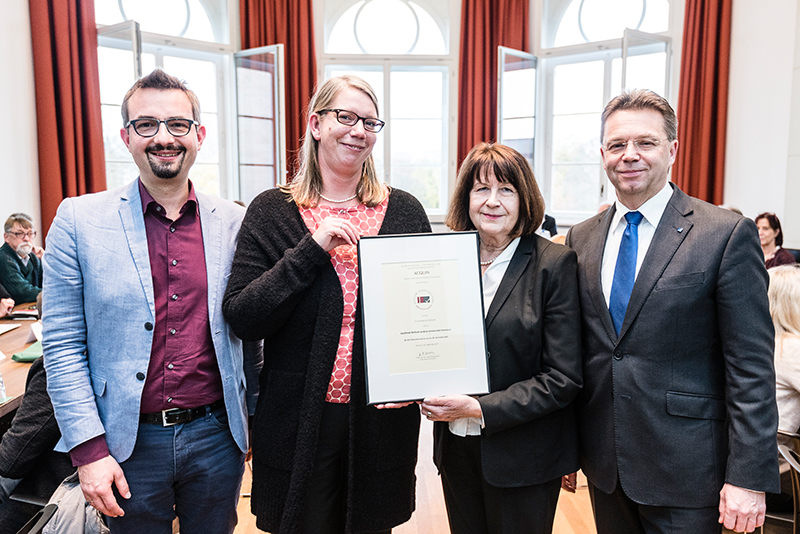 ©
Moritz Küstner / LUH
©
Moritz Küstner / LUH
Central components of internal quality assurance
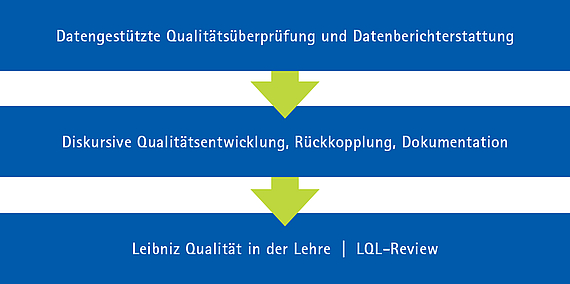
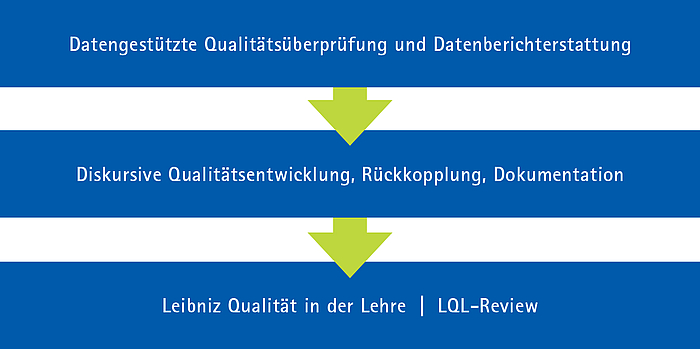
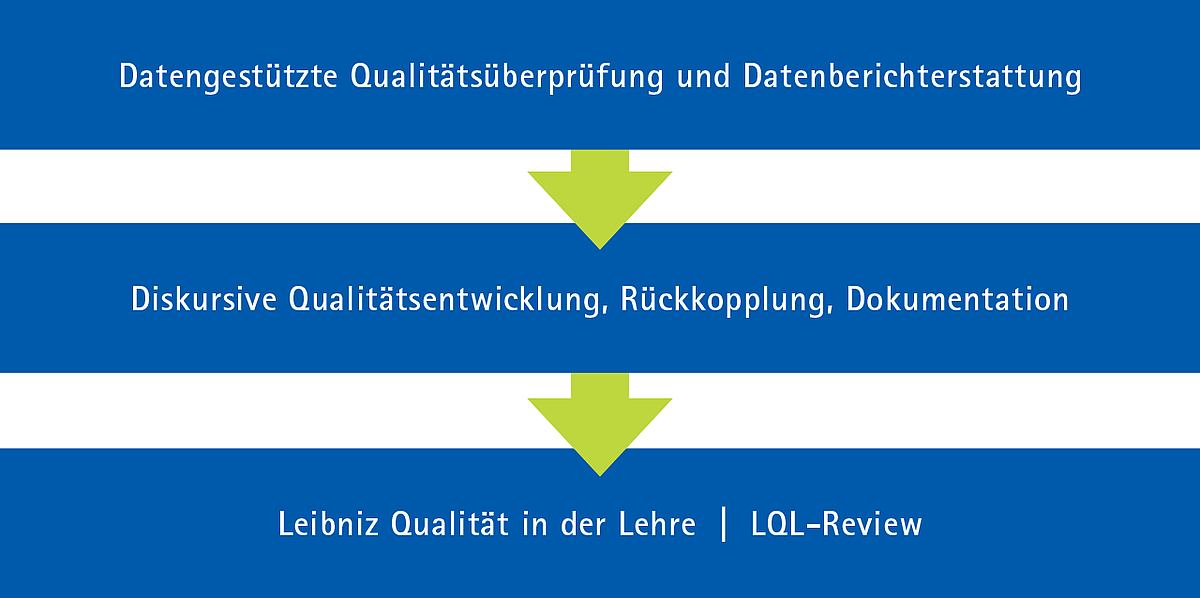
Data-supported quality monitoring
Leibniz University Hannover employs a range of different data-supported instruments and measures in the field of evaluation and monitoring in order to gain information on the quality of study and teaching and obtain indications for further development. This range of instruments extends – according to the orientation of the strategic quality goals within the framework of the academic cycle – across the entire “student life cycle” with the study-phase-specific requirements and problems present in each case.
The instruments in the field of monitoring and evaluation include:
The data that is gained from these instruments becomes part of the processes of discursive quality development and is also an object of consideration in the course of the LQL-Review, which is carried out for existing courses of study at six-year intervals.
Discursive quality development and feedback
The quality strategy of Leibniz University Hannover relies on a discursive, communicative approach with the participation of various actors. Results of data-supported quality monitoring become part of the consultation processes. The process of discursive quality development takes place at both central and decentralised levels. Students are closely involved in these processes.
The following are among the fora in which advice is given on the quality of study and teaching:
-
Study commissions and QM committees with student majorities
Discussion of the results of the QM instruments and the derivation of suitable measures for further quality development in study programmes takes place predominantly on a decentralised level. Study commissions and QM committees play an important role.
According to the University Law of Lower Saxony, study commissions are to be set up with a student majority. The presidency is held by the academic dean, who has no voting rights. The study commissions advise the faculties on matters of teaching, study and examinations.
With the transfer to system accreditation, QM committees have been selected in the faculties and teaching units by resolution of the faculty councils. Depending on the structure of the faculties, QM committees can be responsible for one or many courses of study. At least 50% of the members belong to the student group. The task of the QM committees is to advise the academic deans in all matters concerning quality assurance in the study programmes on a devolved level. The advice given by the QM committees is taken into account by the academic deans in the creation of annual reports on the quality of study and teaching in the study programmes which address, among other things, the results of the continuous quality assurance instruments. As a rule, the tasks of the QM committees are transferred to the study commissions.
-
Quality consultations between the VPL and academic deans
At least once a year, a quality consultation takes place between the Vice President for Education and the individual academic deans. The main focus of this consultation is the quality of study and teaching.
-
Study programme and quality consultations of the VPL with study commissions and the QM committees
A basic component of the expansion of quality management is study programme consultations between the Vice President for Education, the study commissions and the QM committees. These refer to developments, challenges in the area of study and teaching and the determination of good practice models. In the course of these discussions, results from data-supported quality monitoring, the implementation of plans for measures to be taken and voluntary commitments that are the result of the LQL-Review are taken into general consideration.
-
Regular sessions of the academic deans
Headed by the Vice President for Education, regular sessions of the academic deans take place, which serve to stimulate mutual exchange and the determination of best practice examples.
-
Study programme coordinator sessions
Headed by the Department for Student and Academic Affairs, regular sessions of the study programme coordinators take place.
-
Extended sessions of the university board with all deans
Every two months, there is a session of the university board with all deans, in the form of an extended board meeting.
-
Subject-related working groups
In subject-related working groups, individual aspects of quality development are attended to in a continuous manner or as and when needed.
Quality assurance working group
The quality assurance working group was set up in 2015 and is coordinated by the ZQS/Quality Assurance. Its task is to ensure suitable coordination of the various projects and measures within the field of quality assurance (among others, quality management and system accreditation, the introduction of an integrated campus management system and the implementation of the model examination regulations). The members of the working group are the study programme coordinators of all faculties and representatives of the administration and central facilities that are responsible for questions of study and teaching.EvaSys working group
The EvaSys working group was set up in 2010. It advises on overarching questions relating to the EvaSys-based implementation of study course evaluation. In this regard, it works on the further development of the relevant processes and instruments of study course evaluation. In addition, it ensures exchange between the faculties and with the ZQS/Quality Assurance. Represented here, from the decentralised side, are, in particular, the EvaSys sub-administrators from the faculties.Recognition working group
The recognition working group was set up in 2010 and has advised since then, under the leadership of the ZQS/Quality Assurance, on overarching questions relating to the recognition of study and exam performance both at home and abroad. Various actors from decentralised and central units take part in the working group. Alongside developing suitable university-wide framework specifications – among others, a university-wide orientation framework for the recognition of study and exam results – it functions as a forum for exchange regarding specific problems of recognition and for the further development of the framework specifications.
Examinations working group (closed)
The examinations working group was used by the Senate to develop the model examination regulations and ensured, from 2012 to 2014, university-wide understanding of related processes in the creation of new and further development of existing study programmes and the related examination-related legal modalities, while playing an important role in the simplification and unification of the framework specifications and their adjustment to quality assurance criteria. -
Feedback and reporting
Processes of quality assurance and quality development in the study programmes which take place at the first instance on a decentralised level will be reported back to the university administration and ZQS. To this end, the academic deans will create a so-called LQL Annual Report once a year, in which it is made clear how quality management in the faculties or the Leibniz School of Education has taken place and, among other things, it details how the results of data-supported quality monitoring have been addressed and how measures have been derived.
-
LQL-review
The LQL is an internal, peer-supported review process which ensures the high quality of the study courses at Leibniz University Hannover and which supersedes the previous programme accreditation as part of system accreditation.





